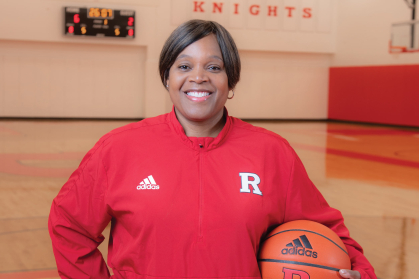A Season of Discovery for Women's Basketball

Some may have billed the current season as a rebuilding year, but Coquese Washington, the new head coach of the Scarlet Knights women’s basketball team, has been telling her team it is a “season of discovery.” Only three players have returned from last year’s squad, which went 11-20. Washington—previously at national powerhouse Notre Dame where she was an assistant head coach—has a 22-year résumé of winning as a coach, including an NCAA national championship at Notre Dame and three straight Big Ten Conference titles as head coach at Penn State from 2007–2019. She also won a WNBA championship as a player for the Houston Comets. Washington, who received her undergraduate and law degrees from Notre Dame, sizes up the season.
RUTGERS MAGAZINE: What have been your expectations for your first season at Rutgers?
COQUESE WASHINGTON: It is been a season of discovery. Because everybody is new to our staff and how we’re doing things, there has been a lot of discovery in understanding what the players can do under game conditions. This is our first time together for the coaching staff, so we’re discovering how we work together and how to elevate one another. I use the word “discovery” a lot because there are a lot of unknowns. But the fun part about coaching is discovering who this team will become.
RM: Give us a sense of how your team has been playing.
CW: We’re definitely an up-tempo team and get a lot of possessions and try to score as many points as we possibly can. We have a defensive philosophy that supports our ability to play up-tempo with a roster of eight. You know, we can’t get into foul trouble and we have to stay healthy.

RM: Given all the changes in the program, how are you defining success this season?
CW: Well, this year has been about setting a foundation, and that starts with our culture. We want players that are energy-givers, who bring positive energy every day. We want the right people in here to embrace the challenge that’s before us. It’s hard to rebuild a program into a national power. The other part is just growing. I’m not saying we’re winning a certain number of games. We only have three players with experience playing in the Big Ten. We have a very young team. Our goals are growth, improvement, and chemistry. That will give us a foundation to build on.
RM: How do you deal with the tradition of the program?
CW: We are not walking away from the history. My undergraduate degree is in history and I love it. I love looking back and finding the building blocks for prior success. We are going to embrace the past. We have Tasha Pointer on our staff who played in a Final Four and she talks to them about what it means to be a Rutgers women’s basketball player. Our players have to embrace the tenacity and toughness that defines Rutgers. It might look a little different in the sets we run, but that heart and strength will be there.
RM: You won a WNBA championship as a player, an NCAA national championship as an assistant coach, and three consecutive Big Ten titles as a head coach at Penn State. What’s the most important common characteristic of those teams?
CW: That will to win. All of those championship teams, even before we played a game in the summer or were in training camp, shared an understanding that we were going for the championship that year. We weren’t letting anything get in the way of that–not injuries or team squabbles. A championship was clearly the goal.
RM: Flint, Michigan, is your hometown and it has a storied basketball reputation. Who is the best player from Flint?
CW: There are too many to name. Flint really has a remarkable basketball history. You can go back to Trent Tucker. Glen Rice might have a leg up because he won the most championships. Deanna Nolan won a couple of WNBA championships playing for Detroit. Then you get to Mateen Cleaves and the Flintstones, who all went to Michigan State. Wow, you’re not getting me in trouble trying to pick one.
RM: You’re in the top 10 all-time at Notre Dame in assists and steals. Which statistic is more meaningful to you?
CW: Definitely the assists. I enjoyed being somebody who made my teammates better. I liked seeing the smiles on my teammates’ faces and the fans’ faces when I made a really sweet pass and they scored. That was ultimate play on the court for me.
RM: Who is the best player you ever guarded?
CW: Oh, that’s not hard: Cynthia Cooper. She was the all-time leading scorer in the WNBA. She had every move, and she could score at three levels: she could shoot the three; she could shoot the pull up; and she could get by you and get to the rim and finish. She played at her own pace. You couldn’t speed her up. She could make the hard, tough shots and she was a clutch player. And she was smart. She knew how to read you and get the shot that she wanted to get, every time. When I guarded her in practice, I said: “Coop, you can’t score on me doing the same move twice in a row.” You could score on me, but you just can’t do the same move twice in a row.